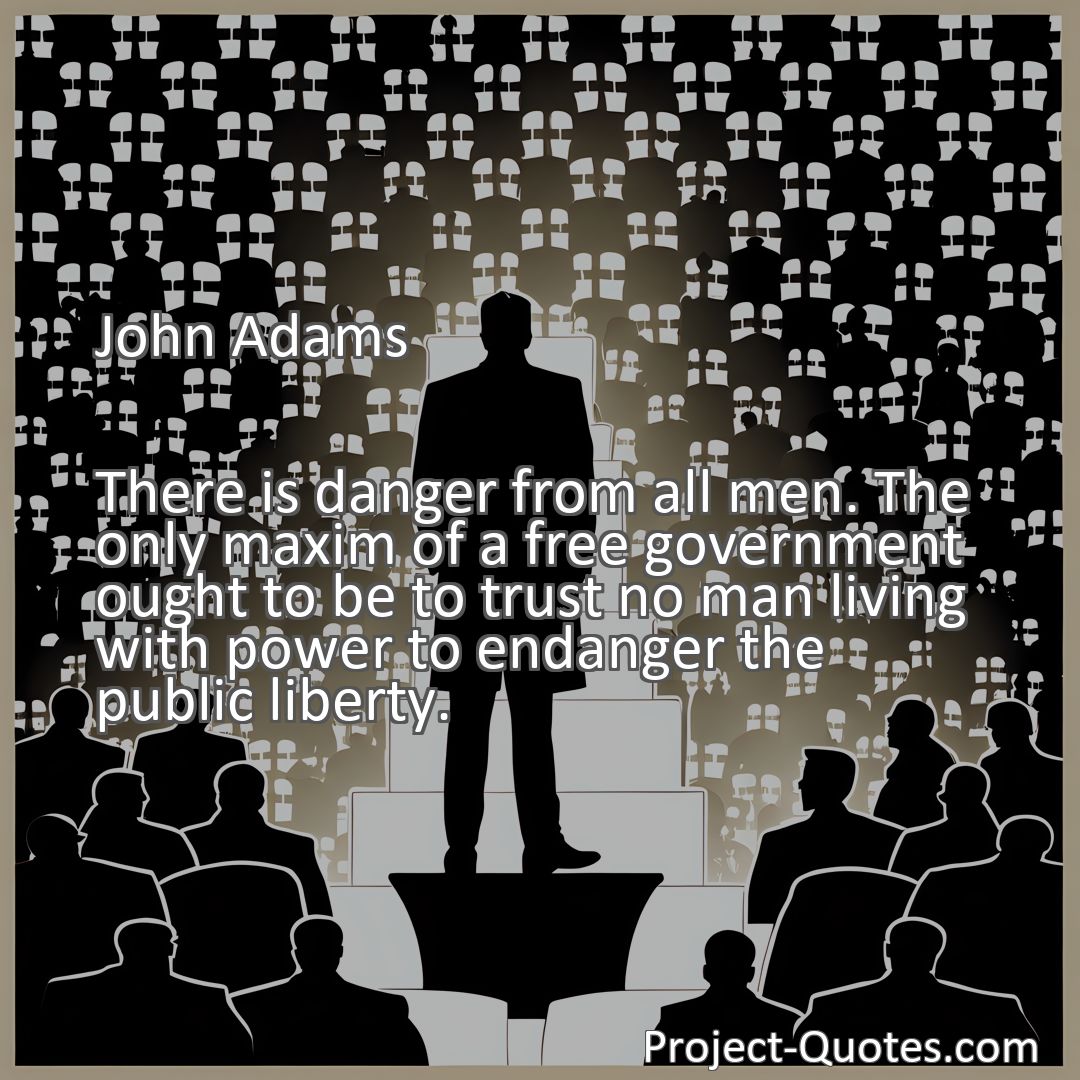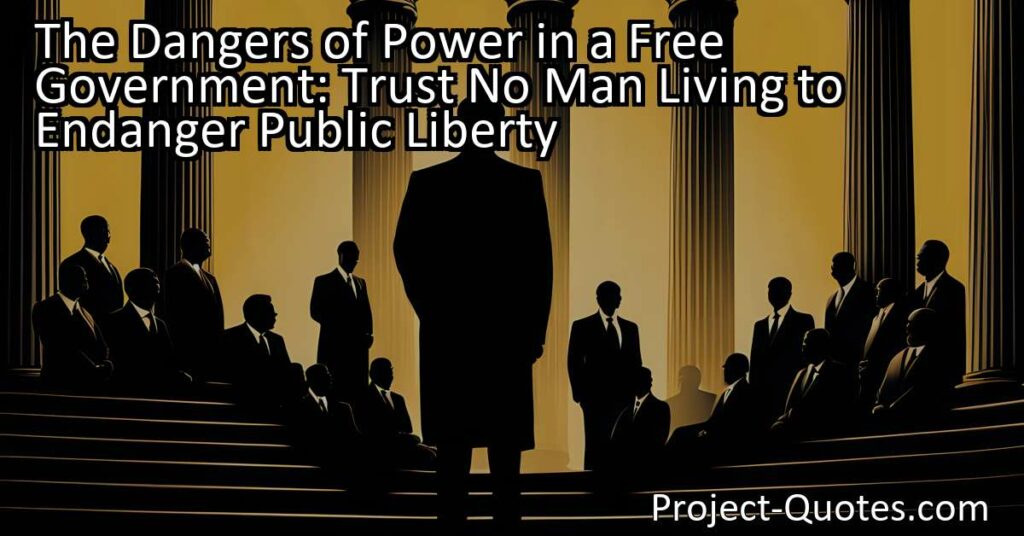There is danger from all men. The only maxim of a free government ought to be to trust no man living with power to endanger the public liberty.
John Adams
The dangers of power in a free government are explored in this thought-provoking quote, reminding us to trust no one with the ability to compromise public liberty. From historical examples to modern-day challenges, it is clear that power can corrupt even those with good intentions. By promoting checks and balances, citizen involvement, and ongoing vigilance, a free government can strive to protect individual rights and maintain a delicate balance between authority and liberty.
Table of Contents
- 1 There is danger from all men. The only maxim of a free government ought to be to trust no man living with power to endanger the public liberty.
- 2 John Adams
- 3 Meaning of Quote – There is danger from all men. The only maxim of a free government ought to be to trust no man living with power to endanger the public liberty.
- 4 Freely Shareable Quote Image
- 5 Related
Meaning of Quote – There is danger from all men. The only maxim of a free government ought to be to trust no man living with power to endanger the public liberty.
In today’s world, where political power seems to hold greater sway than ever before, the words of this quote resonate strongly. “There is danger from all men,” it starts, suggesting that no matter who we may encounter in positions of authority, we must always remain cautious. It goes on to state that the fundamental principle of a free government should be to trust no one with the power to compromise the public’s liberty. These ideas evoke a sense of skepticism and vigilance, capturing the essence of what it means to live in a society where the balance between individual rights and governmental control is delicate.
When examining the quote more closely, it becomes evident that inherent dangers lie not only in individuals but also in the concentration of power itself. Throughout history, we have witnessed numerous instances where leaders or governing bodies have abused their authority, resulting in the erosion of personal freedoms. Hence, it is crucial to contemplate how a free government can ensure the safety and liberty of its citizens while navigating the complexities of power dynamics.
The notion that “there is danger from all men” suggests that no one is immune to the temptations and corruptions associated with power. It serves as a reminder that even those with the best intentions can succumb to the allure of authority. This concept aligns with the age-old adage, “power corrupts, and absolute power corrupts absolutely.” It implies that when an individual acquires unchecked power, they are prone to exploiting it for personal gain, disregarding the interests and rights of the general public.
Taking this into account, it becomes clear why the maxim of a free government should be to trust no one living with power that could endanger public liberty. This principle serves as a safeguard against the potential abuse of authority, ensuring that no one person or group possesses absolute control over the decisions and actions that impact society. By embracing this maxim, a government recognizes the importance of checks and balances, transparent processes, and citizen involvement.
History provides us with ample examples of societies where trusting individuals with power led to disastrous consequences. Dictatorships, monarchies, and totalitarian regimes have all demonstrated the dangers inherent in placing unwavering faith in a single figurehead or governing body. The absence of accountability and the suppression of dissenting voices result in the erosion of civil liberties, stifling progress, and inhibiting societal well-being.
Conversely, democratic societies strive to distribute power among various branches and entities, ensuring that no one faction can dominate the decision-making processes. The separation of powers, often seen in the division of executive, legislative, and judicial branches, aims to prevent any one authority from wielding unchecked control. This system of checks and balances is designed to uphold the public’s liberty by ensuring that no single entity can infringe upon the rights and freedoms of the people.
However, even in democratic systems, the maxim still rings true. Vigilance remains essential in holding those in power accountable and preventing the gradual erosion of individual liberties. To achieve this, mechanisms are put in place to scrutinize the actions of elected officials, including the media, independent judiciary, and public discourse. An informed and engaged citizenry acts as a vital counterbalance, ensuring that those entrusted with power remain mindful of their responsibilities.
Moreover, advancing technology and the increasingly interconnected nature of our world have opened up new avenues for the concentration and abuse of power. Within the digital realm, data and privacy have become significant concerns. The accumulation of personal information by governments or corporations raises valid apprehensions about the potential for manipulation and control. In this context, the maxim of trusting no one with power to endanger public liberty takes on an added dimension, calling for heightened protection of individual rights in the face of advancing technology.
An inclusive understanding of the quote also recognizes that the danger lies not only with those in positions of power but also within the wider societal fabric. It acknowledges the potential for corruption, oppression, and a disregard for the rights of others in all individuals. By embracing this perspective, we are encouraged to question not only the actions of those in authority but also our own values and behaviors. In cultivating a culture of civic responsibility and ethical conduct, we contribute to the preservation of public liberty.
In conclusion, the quote “There is danger from all men. The only maxim of a free government ought to be to trust no man living with power to endanger the public liberty” imparts a powerful message about the inherent risks associated with power in any society. It emphasizes the necessity for skepticism and vigilance towards authority figures, regardless of their intentions. The maxim, far from advocating for a society fraught with suspicion, seeks to establish a balance between individual liberties and the proper exercise of power. By continuously evaluating the actions of those in power and fostering an engaged citizenry, we can strive towards a free government that safeguards the public’s liberty for generations to come.
I hope this quote inspired image brings you hope and peace. Share it with someone who needs it today!


